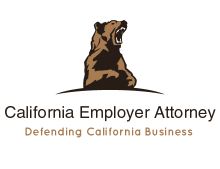
2013 New California Employment Laws
Welcome to 2013! It’s a new year but a good California Employer never rests in defense of their business! If you are a regular reader of our blog then you know that our mantra is always ‘preparation is the best defense.
So if you have listened to us then you already have that all important Employee Handbook and you are keeping track of employee policies and procedures. But a new year is upon is and it is important to find out the new laws introduce in 2013 and how they might effect you.
Below is a list of some of the more significant new employment laws of 2013.
Social Media AB 1844
A new law for 2013 that has probably gotten the most press is the AB 1844. Called by many the Social Media Law, it forbids employers from asking employees or job applicants for social media usernames and passwords. This would cover Twitter, Facebook, Linked or the many other private social media accounts.
Despite the media firestorm (stories that sensationalize privacy fears do well) we feel this law should not impact most California employers to much. For one thing, we cannot really see a reason why employers would need their employees social media passwords. From a common sense point of view its clear that this is a no brainer. This new provision just makes this technically unlawful and prohibits employers from firing an employee for not providing that personal information on demand.
Access to Personnel Records AB 2674
Potentially much more of a headache to employers is the change to Employee Personnel records. This change clarifies some inconsistencies in a law regarding personnel records enacted over a decade ago. It gives former employees the same rights as current employees to request access to and inspect their company records. This is big! If a former employee is requesting their records from your company it is potentially because they want to file a claim or suit against you. Creating and keeping solid records, policies and Employee Handbooks is more important then ever!
Employers are now required to provide access to the records (or a copy) within 30 days of the employee requesting it. But that’s not all. Your business will be on the hook for a $750 penalty for non compliance, plus the possible legal fees incurred by the requester in trying to force you to comply. As a California employer you are required to keep terminated employees personnel records on file and accessible for at least 3 years.
One small ray of sunshine in this law is they have reduced the penalty for non-compliance. Before it was considered a misdemeanor to refuse to provide an employee record but that has now been reduced to a penalty. Considering in a misdemeanor jail time is technically possible this is good news for employers!
Even with the new provisions to this law there is a lot of ambiguity. For example when it comes to what must be provided to the employee (what constitutes a personnel record) it is vague. It only says that any records for the employee that include their performance or grievances against the employee must be provided to them.
Here are some of the other laws going into effect for 2013. Look for us to have a more detailed article about what you need to know about each. This page will soon have links to pages detailing each provision.
Religion and Reasonable Accommodation
An increase in protection of religious practices in the workplace. This came about as part of the “Workplace Religious and Freedom Act of 2012“. This law signed in by Governor Brown, protects religious accommodation after a recent increase in complaints in California by employees in recent years.
It is important to note that the accommodation includes an employees religious observances and practices. This is going to mean that an employer must be very lenient in allowing their employees to dress and groom in certain ways if it is for religious reasons.
Breastfeeding Discrimination AB 2386
Modifications to Law requiring employers to not allow discrimination of employees who are breastfeeding. Click on the link above for an article with more details on the new 2013 breastfeeding discrimination.
Pregnancy Disability
The new law expands and further clarifies pregnancy discrimination laws. It also requires employers (who have 5 or more employees) to allow their pregnant employee up to 4 months leave related to the pregnancy. There is no restriction on how long the employee has worked for the company. In other words a pregnant employee who has worked for you for only 3 months would have the same option for 4 months pregnancy leave as one who has worked for you for 3 years.
Disability Discrimination and Accommodation
This new law helps clarify disability discrimination and accommodation. It has expanded the definitions of mental and physical disability and even includes specific examples, like OCD, post-traumatic stress and heart disease among others.
Itemized Wage Statements
The legal requirements have become more defined for employers when it comes to wage statements. You are now required as a California employer to follow the guidelines in Section 226.
This rule requires that you provide information to your employee on either a regular basis or when they are paid.
The information you must provide includes:
- Total Hours Worked
- The Dates of the Pay Period
- The Name and Address of Your Business
- All Deductions
These are not all the requirements but the ones that stood out the most to us.
If you are proven to knowingly and intentionally kept this information from your employee you could be vulnerable to penalties. If you can prove that it was not intentional and some type of clerical error you may be able to avoid penalties.
Wage Garnishment
The changes here in AB 1175 increase the amount of wages that are exempt from garnishment. This change does not go into effect until after July 1st of 2013. Before this change only about $217 dollars a week is protected from garnishment. Hardly enough to make any real impact!
Workers’ Compensation Reform
Senate Bill 863 This is an attempt by the state to reforms workers compensation by lowering cost and increase savings. If these changes work out as expected it may actually benefits employers by lowering your overall cost.
Some of the key details can be found below.
- Utilization Review, Independent Medical Review
- Qualified Medical Evaluator Regulations and PDRS
- Independent Bill Review
- Electronic document filing and lien filing fee
- Self-Insurance and Annual Actuarial Reports
- Interpreter Services
- Supplemental Job Displacement Benefits
- Hospital outpatient departments and ambulatory surgical centers fee schedule
Accessibility Reform
 SB 1186 is mean to reign in the frivolous litigation we have seen over the years regarding technical violations for accessibility.
SB 1186 is mean to reign in the frivolous litigation we have seen over the years regarding technical violations for accessibility.
It is meant to:
- Reduce Statutory Damages
- Prevent multiple claims by the same party
- Forbid letters demanding payment before a litigation claim (some have likened this to extortion)
Unemployment Insurance: Overpayment and Penalties
AB 1845 clarifies the states position that the Employment Development Department or EDD, can deny reimbursing you the employer if you overpaid in unemployment insurance. Specifically if they determine the cause of the mistake was made by you, your business did not respond to the EDD in a timely manner or you did not provide all the needed information.
Conclusion
Remember this is not ALL the new laws for 2013 but the ones we think most impact our readers.
If you are a California business owner who has ANY questions on the new 2013 Labor Laws or any other employment matters contact our professional labor attorneys today. We specialize in Employer defense and ONLY protect business owners!
We are professional labor attorneys who specialize in defending California business owners. Contact Us Today!


